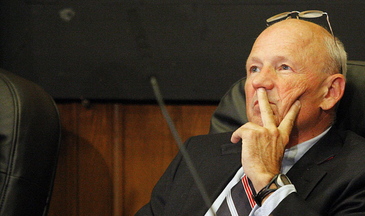Portland’s mayor is not a big-city boss. He can’t hire or fire city employees; he can’t negotiate contracts with the unions; he can’t overrule a majority of the City Council.
But the mayor does have some authority, and in only the second year of an elected mayor form of government, we are just starting to see what that means. According to the city charter (but not the council rules), the mayor has control of the council’s agenda, and he can include or rule out items put forward by other members of the council.
This is a break with longtime past practice, where any councilor could bring forward any issue he or she thought was important enough to be official city business. Mayor Michael Brennan has irked some members of the council by refusing to move their pet issues forward, a practice one councilor described as a “pocket veto” in an email to Brennan.
It may be a change, but it is a change that the voters approved in 2010, when they amended the charter to move to a popularly elected mayor. The people voted to have a mayor who had control over the agenda, and Brennan’s job is to say “no” as well as “yes.”
The absence of clear lines of responsibility was one of the things that led voters to create a charter commission in the first place. At times, it seemed that Portland had nine mayors and it was never clear if anyone was in charge or speaking for the city as a whole.
The mayor’s position was created to introduce some discipline and accountability. The mayor decides which issues the council will tackle and which should be left alone. If the mayor develops a pattern of keeping important issues off the agenda, that is an issue for the voters to consider next time he’s on the ballot. Another factor would be the progress the city makes on the issues the mayor does choose to focus on.
In the past, the council’s practice was like the one used by the Maine Legislature, where every bill gets a hearing and a vote on the floor. That means proposals to give whoopie pies official status or legalize switchblades for people with one arm get the same place in the process as serious proposals on education, health care and human services.
The Portland charter does not call for a “strong” mayor, but it does call for a mayor. Brennan should use all the powers he has under the charter and steer the city government.
That’s not too much power for the popularly elected mayor: It’s what the voters wanted.
Send questions/comments to the editors.



Success. Please wait for the page to reload. If the page does not reload within 5 seconds, please refresh the page.
Enter your email and password to access comments.
Hi, to comment on stories you must . This profile is in addition to your subscription and website login.
Already have a commenting profile? .
Invalid username/password.
Please check your email to confirm and complete your registration.
Only subscribers are eligible to post comments. Please subscribe or login first for digital access. Here’s why.
Use the form below to reset your password. When you've submitted your account email, we will send an email with a reset code.